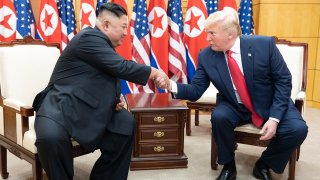Donald Trump and North Korea: What Happens if Trump Wins in 2024?
A second Donald Trump administration’s North Korea policy would be uncannily similar to the current Biden administration’s for two reasons: North Korea’s loss of trust toward the U.S. and South Korea since late 2019 and Trump’s preoccupation with domestic politics.
A second Donald Trump administration’s North Korea policy would be uncannily similar to the current Biden administration’s for two reasons: North Korea’s loss of trust toward the U.S. and South Korea since late 2019 and Trump’s preoccupation with domestic politics.
North Korea’s lack of interest and response to the Biden administration’s repeated diplomatic efforts indicated the mounting distrust toward the U.S. North Korea was unresponsive to backchannel contact efforts during the early days of the Biden administration in January 2021, suggesting its lack of interest in communicating with the U.S. since the breakdown of bilateral nuclear diplomacy, the last public one being the Stockholm working-level talks in October 2019.
This lack of interest was reaffirmed recently by its lack of response to the U.S. in the summer of this year over the defection of US soldier Travis King. Pyongyang responded days later but only to the UN Command. And skirting the U.S. altogether, North Korea sent King back, dashing any hope for negotiations that could have spilled over to other subjects.
It certainly does not help that North Korea has lost its faith in South Korea as an intermediary since 2020 and the current Yoon administration trumpeting the importance of achieving “peace through strength,” even as it claims that it is open to dialogue. The latter, however, is questionable as Yoon had repeatedly criticized the previous Moon administration’s inter-Korea diplomacy as a “political show” and “false peace.”
Meanwhile, North Korea called Yoon a “puppet traitor,” among other things, in response to his UN speech warning about deepening Pyongyang-Moscow ties.
Such exchanges of hostile rhetoric will likely persist until at least 2027, when Yoon leaves office, rendering any meaningful inter-Korea engagement and South Korea’s intermediary role in future US-North Korea diplomacy impossible.
In addition to losing North Korea’s trust and South Korea as a mediator, the second Trump administration will be too heavily invested politically at home to mobilize reliable diplomatic resources and capital for embarking on attempts to resuscitate US-North Korea diplomacy. In contrast to Trump, Kim Jong Un has the luxury of being free from having to engage in domestic political mudslinging and retaliation.
As Trump plots his political revenge at home, Kim will gain even more time advancing North Korea’s nuclear programs and expanding its military cooperation and arms deal with old and new partners, raising the bar even further for high-level negotiations to take place during the second Trump administration.
About the Author
Minseon Ku is a Rosenwald postdoctoral fellow in US Foreign Policy and International Security at the John Sloan Dickey Center for International Understanding at Dartmouth.
Image Credit: President Donald J. Trump and Chairman of the Workers’ Party of Korea Kim Jong Un speak to reporters Sunday, June 30, 2019, as the two leaders meet in Freedom House at the Korean Demilitarized Zone. (Official White House Photo by Shealah Craighead).

